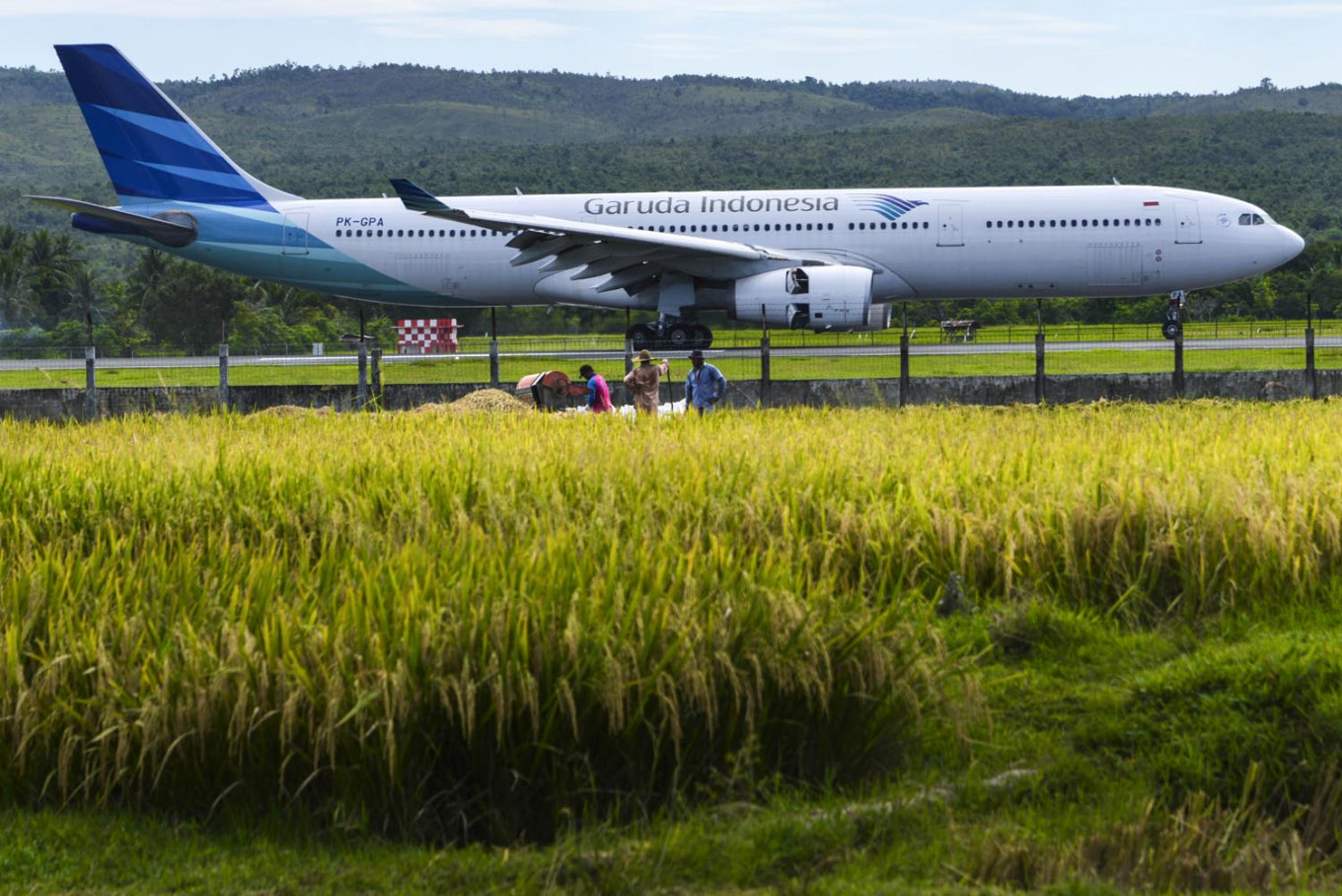Popular Reads
Top Results
Can't find what you're looking for?
View all search resultsPopular Reads
Top Results
Can't find what you're looking for?
View all search resultsGaruda, Krakatau Steel receive funds through MCB issuances
The MCB scheme channeled to both companies is part of the government’s Rp 695.2 trillion national economic recovery (PEN) program.
Change text size
Gift Premium Articles
to Anyone
N
ational flag carrier Garuda Indonesia and state-owned steelmaker PT Krakatau Steel issued on Monday mandatory convertible bonds (MCB) worth trillions of rupiah as a means to receive a state capital injection to weather the economic downturn caused by the coronavirus outbreak.
The MCB agreements were signed separately by the companies with state-owned infrastructure financing company PT Sarana Multi Infrastruktur (SMI), which is appointed to carry out such investments allocated in the government's national economic recovery program.
Garuda issued Rp 1 trillion (US$70.6 million) in MCBs with a three-year tenure from a total of Rp 8.5 trillion worth of planned MCBs in a span of seven years to improve the company’s liquidity, solvability and to cover operational costs. The remaining Rp 7.5 trillion will be issued gradually, said Garuda Indonesia president director Irfan Setiaputra.
“The issuance of the MCBs will build an optimistic outlook for our company next year. We believe that the MCBs can consistently accelerate Garuda Indonesia’s performance,” he said during a virtual press briefing on Monday.
In July, the House of Representatives gave permission for the government to provide a capital injection for the airline in the form of MCBs to soften the pandemic’s impact on the company. The MCB will require a conversion of the bonds into stocks in accordance with the contractual conversion date.
The MCB scheme for both companies is part of the government’s Rp 695.2 trillion national economic recovery (PEN) program.
The COVID-19 pandemic has hit the aviation industry hard with movement restrictions in various countries around the world discouraging people from traveling. The International Air Transport Association (IATA) has said that 2020 was the worst year in history for airlines around the world, with many expected to face a combined $84.3 billion in losses.
According to the company’s financial report, Garuda Indonesia booked $1.07 billion in losses in the first nine months of the year, a reversal from the $122.4 million profit it saw in the corresponding period last year. Its revenue also dropped sharply over the same period, falling by 67.8 percent year-on-year to $1.13 billion.
Stocks of Garuda, traded at the Indonesia Stock Exchange (IDX) with the code GIAA, has increased by 2.31 percent as of 1:23 p.m. Jakarta time on Tuesday as the main gauge, the Jakarta Composite Index (JCI), slipped 0.29 percent.
The Garuda Indonesia Group, which consists of full-service airline Garuda Indonesia and low-cost carrier Citilink, saw passenger numbers nosedive to 8 million passengers in the January-September period, down 65.6 percent from 23.3 million in the same months last year.
However, Irfan said the company flew around 739,000 passengers in October, a significant increase from the monthly average of some 30,000 this year. He added that negotiations on aircraft rent and operational costs had also saved Garuda Indonesia $15 million.
“We aim for our 2021 revenue to reach 50 percent of our 2019 revenue; that is our promise to the State-Owned Enterprises Ministry,” he said, referring to Garuda’s $4.57 billion revenue last year.
Institute for the Development of Economics and Finance (Indef) economist Eko Listiyanto told The Jakarta Post that Garuda’s success in achieving its revenue target for next year would highly depend on the overall economic recovery.
“It will not be an easy task for Garuda Indonesia to improve its financial performance despite the added funds from the MCB issuance,” he said on Monday.
Eko added that public demand to fly again would be more decisive in determining Garuda Indonesia’s prospects for improved financial performance.
Read also: House approves $10.32b stimulus for state companies
Separately, Krakatau Steel also signed a similar agreement with PT SMI to issue Rp 3 trillion in MCBs with a tenure of seven years, as the publicly listed steelmaker had a negative net working capital while its liabilities exceeded assets by 80 percent.
“With this injection, we hope the operations of the downstream industry can recover. This will also safeguard the domestic steel market as the failure of Krakatau Steel to fulfill the market [demand] will encourage flows of imported products,” president director Silmy Karim said in a statement on Monday.
The company saw its losses ease to $27.4 million as of September compared to the same period last year as its revenue dropped almost 11 percent year-on-year (yoy) to $938.79 million. However, the figure is a reversal from $4.51 million in net profit recorded in the first half.
The funds from the bonds will be used to stretch payment periods, or cash conversion cycles, from 90 days to a maximum of 180 days, which is expected to encourage customers to buy more steel without hurting their or Krakatau Steel’s finances, finance director Tardi said in November.
Stocks of Krakatau Steel (KRAS) have gained 0.91 percent as of 1:56 p.m. Jakarta time on Tuesday.










